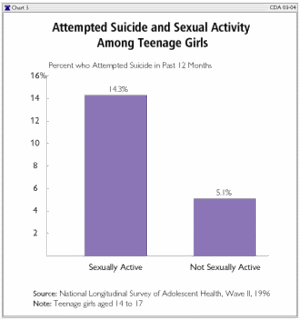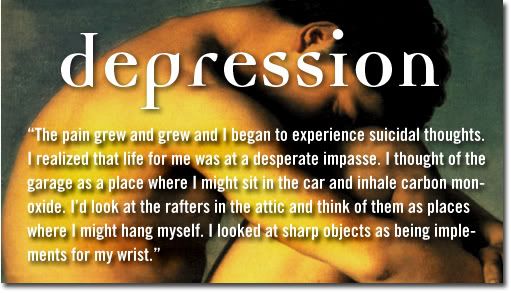|
When Suicide Is Healthy
Klepper's story outlines the essential conflict in Kansas.
The U.S. Supreme Court has ruled that health exceptions must apply to mental health, too. Or maybe Dr. Tiller is saving women's lives. Depression not only is the most prevalent risk factor for suicide, but almost a prerequisite. And no other health condition is more substantial or irreversible than death. Suicide is the third leading cause of death among people aged 15-24 years, and the second leading cause of death in college students. That is the same age range of most women who seek abortion care, and those statistics do not even take into account that 10-20% of pregnant women of all ages suffer symptoms of major depression. Teenaged patients of Dr. Tiller also have been a special focus of Phill Kline's investigation. A 1998 Ohio State University examination of adolescent pregnancy concluded that, in addition to carrying significant mental health risks, pregnancy poses serious threats to a teenager's physical health, with ramifications that can affect her for the rest of her life, and even end her life prematurely.
For the young mother, teen pregnancy and childbearing has been associated with several health risks and outcomes. Adolescent mothers, especially those under age 15, have higher rates of birth complications, including toxemia, anemia, hypertension, eclampsia, prolonged or premature labor, uterine dysfunction, pregnancy-related infections, postpartum hemorrhaging and abnormal bleeding, and premature rupture of the uterine membrane (Hayes, 1987; Jorgensen, 1993). In addition, teen mothers have higher rates of maternal mortality and morbidity than their older counterparts. Mothers under age 15 may experience a maternal death rate that is 2.5 times the rate for mothers aged 20 to 24. ... Finally, teen mothers are in jeopardy psychologically because they experience higher levels of stress, despair, depression, feelings of helplessness, low self-esteem, a sense of personal failure, and suicide and suicide attempts than their older counterparts (Jorgensen, 1993). The State of Massachusetts officially cites an increased risk of suicide among pregnant teenagers.
The suicide rate for adolescents has increased more than 200% over the last 10 years. The Heritage Foundation, a think tank relied upon to buttress the positions of the Christian right, has produced its own report: Sexually Active Teenagers Are More Likely to Be Depressed and to Attempt Suicide. The Heritage Foundation report, produced as an endorsement of abstinence, can equally be read as evidence of necessity for a mental health exception for abortion.
The problems of pregnancy and out-of-wedlock childbearing are ... severe. In 2000, some 240,000 children were born to girls aged 18 or younger.[3] Nearly all these teenage mothers were unmarried. ... Less widely known are the psychological and emotional problems associated with teenage sexual activity. The present study examines the linkage between teenage sexual activity and emotional health. The findings show that:
But anti-choice lawmakers aren't listening, not even to their own noise machine. Some young pregnant women might kill themselves, but that's insignificant when compared to the number of abortions that might be prevented by getting rid of that pesky mental health exception once and for all. And once we start slicing and dicing women's health, that's only the beginning of the exceptions we can do away with.
Declaring that "we must protect unborn children, given the priorities of mothers in our society," Hartnett and his Christian right allies engineered passage of a law that now makes it illegal for a woman in Texas to have an abortion after 24 weeks, even if remaining pregnant will irrevocably damage her heart, liver, lungs, kidneys or any other vital organ besides her brain -- and even then, the brain damage must be "severe and irreversible." "If you have your mind, the rest of it is secondary," said Hartnett, and "impairment to a woman's health" can't justify abortion when "we could be killing off Einstein" just because "a woman might have some organ damage." The law of the State of Texas now officially agrees with Will Hartnett that both women and their babies "can live without anything but a brain." Maybe they don't even need that much, because if Hartnett was right, a dead man can even serve in the Texas legislature. Several Kansas lawmakers say that they support crafting a narrow mental-health exception into state law to bar depression from being considered as a justification for abortion. Texas still has a nominal health exception, but mental health -- or physical health, for that matter -- is now defined as the absence of severe and irreversible brain damage. Before they start down the road to sacrificing women upon the "pro-life" altar, perhaps legislators in Kansas and the rest of the country should think long and hard about what it might really mean to decide that mental health isn't really "health" at all. Image: School of Public Affairs, University of Michigan. Quotation from William Styron
[Title image: Detail from "Gestation Self-Portrait," by Rae Maté]
When Suicide Is Healthy | 3 comments (3 topical, 0 hidden)
When Suicide Is Healthy | 3 comments (3 topical, 0 hidden)
|
||||||||||||
| ||||||||||||




 print page
print page


